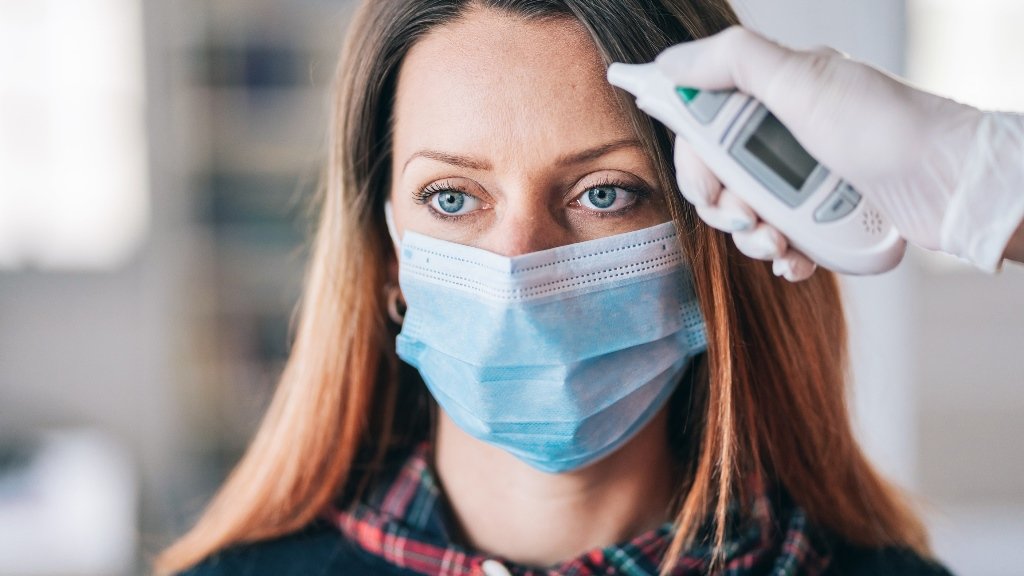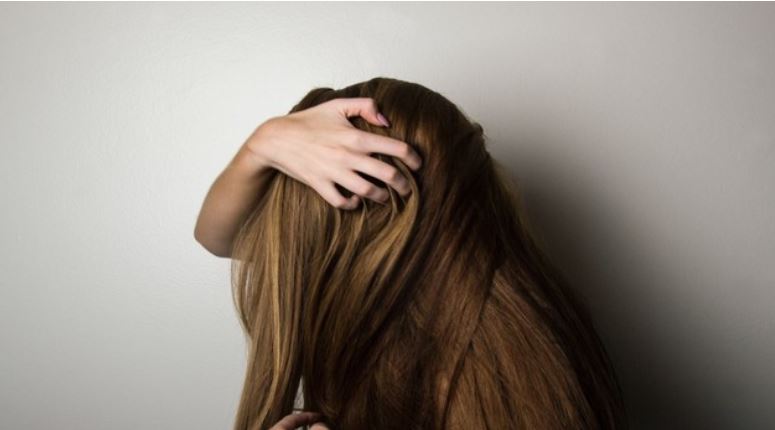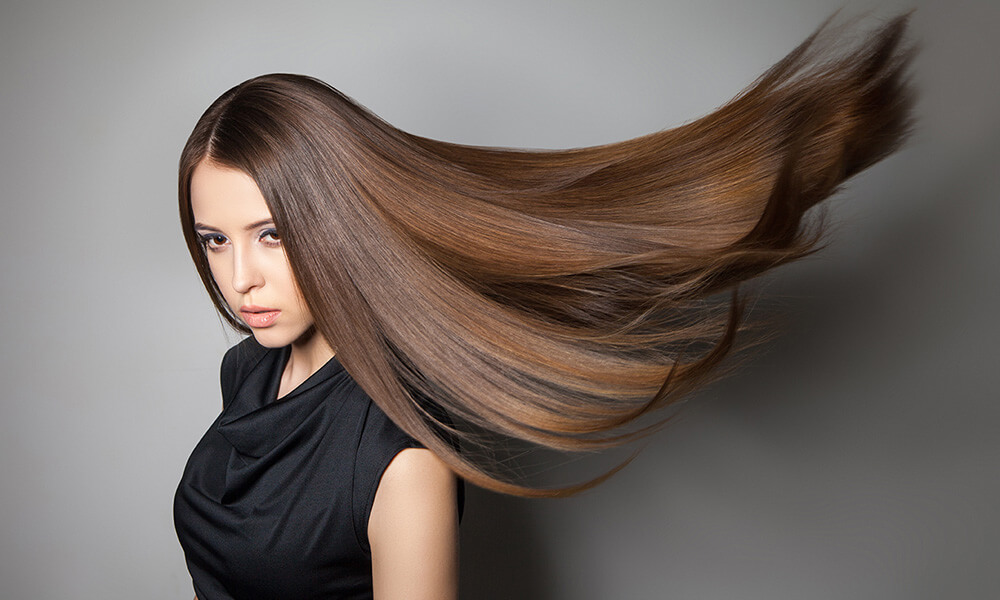This question excites the minds of many people. The consequences of coronavirus can range from loss of smell and muscle weakness to increased thrombosis. One of the most pressing questions that trichologists are often asked is how to deal with hair loss after suffering COVID-19. We tell you why coronavirus stimulates hair loss and what to do about it.
Mankind has finally learned how to cure hand dryness of soap and antiseptic use, and they are even registering vaccines for the new coronavirus and many have already been vaccinated. But COVID-19 has given us a significant new problem: Many people who have had the disease have noticed that they have more hair left on their hairline and less hair left on their head. The experts tell us why it doesn’t look like a coincidence.
#LongHauler
“I think I showed you what #Covid19 does to your hair. Please take it seriously,” is the caption with which actress Alyssa Milano posted an Instagram video of her combing and showing how much hair is left in her hands and on the comb. Plenty.

British makeup artist Grace Dudley also told about gigantic wisps of hair that were left on the pillow: she was in the hospital for two weeks, and a month later her hair began to fall out. And so actively that she decided to shave her head.
In a video posted on Twitter, the “Charmed” star showed large clumps of strands coming out of her brush after running it through her wet hair. And these cases aren’t unique at all: In support groups like Survivor Corps on Facebook, where coronavirus patients share their research and personal experiences, you can find hundreds of stories of people who call themselves Long-Haulers – patients who suffer or think they suffer from long-term COVID-19 symptoms (the hashtag #LongHauler marks Milano’s post). And dozens of these stories will tell just about the hair loss after suffering from the coronavirus. It’s important to note that no serious medical studies of this phenomenon have been done so far: the typical work in this direction is a survey conducted by Indiana University’s Dr. Lambert of participants in those very support groups.

!!!!! Disruption of hair follicles in women and men does not depend on the severity of the disease and can appear even in asymptomatic carriers!!!!
How to identify the symptom
Hair loss as an unusual symptom of COVID-19 did not become known until the summer of 2020 when the number of patients complaining of intense hair loss increased dramatically. It became known that within 1-2 months after the disease, patients noticed a sharp deterioration in their condition and fever that could not be brought down with medication.
There is a simple test to determine the degree of hair loss: a specialist pulls small strands and pays attention to the amount of hair loss. If more than 5 hairs remain in the hands after each pull, it indicates hair loss. Often after having the virus, patients are afraid to touch their hair,
combing them and even washing their hair so as not to aggravate the problem.
Reasons
Any viral infection can cause hair loss, regardless of whether the patient has a fever or is taking antiviral or antibacterial medications, which often cause similar symptoms.
There are some medications that can provoke hair loss or telogenic alopecia. For example, this category includes drugs of the interferon series, which are available in almost every medicine cabinet.
This group of drugs has been very popular in recent years, but few people know that prolonged intake of interferons leads to acute telogenic hair loss.
The combination of COVID-19 and interferon symptoms can be a double blow to hair follicle health. We need to remember that any strain leads to a decrease in important vitamins and trace elements in the body. They are necessary for normal growth and the formation of a healthy hair follicle.
Vitamin d
For example, various viruses affecting the body suppress the receptors to absorb vitamin D, which plays an important role in the formation of a healthy and strong immune system.
According to a 2009 study cited in Clinical Immunology Expert Reviews, vitamin D is needed to increase the production of white blood cells, an important component of the immune system. When it is deficient in the body, white blood cells don’t get enough material to produce the enzymes that help them recognize and destroy viruses.

Experts point out
“There have been increasing reports of patients attributing hair loss directly to covid,” confirms the trichologist. – There can be various reasons for this. For instance, taking various medicines that may have a toxic effect on the body and as a result, provoke hair loss. But to say for sure you need to understand what drugs were used for therapy, and then you will have a clear picture of the hair correction”.
Immune response could also explain hair loss in coronavirus survivors. “COVID-19, like other viral infections, provokes immunity, thus stimulating autoimmune reactions. Let me clarify a little: autoimmune reactions – is a manifestation of the immune system’s fight against foreign agents, during which it affects its own cells, – says a dermatologist, cosmetologist of the Institute of Cosmetology Le Colon. – This is the so-called cytokine storm – a situation in which immunocompetent cells secrete large quantities of cytokines (substances that kill foreign cells, viruses, and bacteria). During a cytokine storm, the body’s own cells can also die.” Christina notes that hair follicles are very immune-dependent, and as a result, they may suffer more often than others when autoimmune reactions occur – with which hair loss may be associated.
But even if cytokine storm is out of the question, resistance to covid can still affect the quality of the hair: when the immune system resists, the body’s resources are diverted to fighting the virus and protecting vital organs. It’s not good for your hair anymore.
The experts note
Hairstylist, creative partner of L’Oréal Professionnel agrees with doctors: “Coronavirus strongly depresses immunity and is associated with taking potent medications – both can affect the phase of hair growth. As a result, they will fall out in 3-6 months after the disease – apparently, this happened to Alyssa, who was sick at the end of March.
Finally, each of the speakers interviewed by The Blueprint mentions stress as one of the main factors of post-coronavirus hair loss, and stress can be physical – high fever and illness itself – or emotional – such as job loss, fear for loved ones, or fear of the not fully understood COVID-19 itself (which means you can lose hair from coronavirus without even experiencing it). All this can lead to telogenic hair loss, which doctors most often talk about in interviews with Western magazines, from Shape to Forbes.

If we explain it in simple words, the process is as follows. About 85-90% of a healthy person’s hair is in the anagen, or active growth stage. The rest of the hair is in the resting phase, i.e. the telogen phase. Hair stays in the anagen phase for two to four years and then goes into the telogen phase, where it falls out and is replaced with new hairs: so hair loss is normal, and you should not be alarmed if you find hairs on your pillow or comb. Losing 80-100 hairs a day is normal. It’s quite another matter when more hair goes into a resting phase and, as a result, falls out. This condition is called telogenic hair loss.
The effect of the virus on the intestine
Close attention should be paid to the state of the intestinal microflora in times of high morbidity, especially after intensive drug therapy. During treatment, patients may suffer due to impaired absorption of substances necessary for the body from foods. This can exacerbate other problems, including affecting hair health.
Experts recommend accompanying therapy with probiotics and including fermented foods in your diet. In combination, this will help your body to recover faster after the disease, and this will have a positive effect on the condition of the hair.
In addition, remember that sudden hair loss in most cases quickly goes away. If the hair loss lasts longer than 6-8 weeks, it is worth consulting a professional trichologist.
Final conclusions of the causes of hair loss after Covid-19:
- When it comes to survival, the body devotes all resources to the production of protective complexes. For other tissues, the hematopoietic system simply does not have enough power.
- Hair follicles are in the epidermis (skin). Due to blood clotting caused by infection, recharge through the capillaries is disrupted.
- During the disease, there is a deficiency of B vitamins, which are necessary for hair growth.
- In addition, any disease is a stress to the body. Its impact is detrimental to all organs and systems.
- The influence of viral intoxication.
- Anemia caused by a disorder of hemoglobin production.
- Liver dysfunction as a consequence of intensive therapy – a side effect after taking antibacterial and hormonal drugs.

Problem Solution
What to do in this situation? If you’re experiencing telogenic hair loss, you can just wait it out – it’s usually temporary. But the best solution is to see a professional trichologist, because hair loss can be due to a host of reasons, from seasonal changes or a bad diet to heredity or hormonal imbalances.
Hair loss is a multifactorial condition that can have different origins. There are certain ways to diagnose each condition: hormonal studies, biochemical and genetic tests. Only a trichologist should treat hair loss because alopecia is a complex condition that requires a thorough approach.
To solve the problem of hair loss, comprehensive therapy is necessary, which includes both medication and external therapeutic techniques. The choice of treatment is made after an examination, which is determined by a trichologist, sometimes in conjunction with other specialists. Local procedures include anti-inflammatory and anti-fibrotic physical therapy treatments with the use of therapeutic lotions, serums and gels, mesotherapy, and PRP therapy.

Vitamins and supplements
As for all kinds of vitamins and supplements for oral intake, before buying them, it is still better to consult a doctor. Dietary supplements are a controversial thing. They can give an effect, but only with the competent prescription and the correct determination of the cause of loss. They are not candy. Every biologically active preparation will have contraindications and side effects. Even innocuous fish oil in huge quantities can be harmful.
Hair care
Also, hair stylists are not advised to resort to the means of folk medicine: masks with pepper, mustard, and other products to improve circulation – there is a risk of skin burns.
At the same time, there are absolutely harmless options for applying to the scalp: all kinds of preparations in ampoules, lotions, and serums, which are available in pharmacies and cosmetic stores without a prescription. Here are the ingredients the experts advised to look for inside: Aminexil (it “softens” the collagen around the hair follicle and prevents hair loss), nicotinic acid (it works as an irritant: provides blood flow, improving tissue tropism), Stemoxidine (awakens dormant follicles and stimulates new hair growth) and antioxidants, such as resveratrol. But experts do not recommend prescribing serums with hormones: if the problem is not hormonal, the results can be unpredictable, as well as the consequences of discontinuing such treatment.
In the end, it is possible to visually increase the bunches by using thickening care products in combination with stylized products. It may not make your hair look bigger, but it will look thicker, and it will do so almost instantly.

We can conclude
How to treat hair that falls out after coronavirus depends on what the alopecia is related to. This requires a complete examination. However, since the problem does not occur immediately, but several months later, many patients do not immediately associate the development of alopecia with the disease. It is because of this that the connection between COVID-19 and alopecia has only been noticed in the last 3 months.
The following tests are recommended:
- biochemistry and general detailed blood test;
- for thyroid hormones – it is possible that alopecia is caused by dysfunction of the organ.
Then it becomes clear who to contact: endocrinologist, an internist (if anemia or problems with intestinal microflora are detected), other specialists.

As soon as the body recovers, the hair will begin to grow back. You need to have patience – the first sufferers share that it took more than 6 months. However, the quality of hair is not restored in everyone. People over 55 years of age are likely to develop baldness. However, this is only a hypothesis – while the problem has not been studied enough, it is too early to make predictions.
Interesting!
- A recent study on the effect of the coronavirus on the hair revealed something interesting. Japanese scientists conducted an experiment involving people who had contracted COVID-19. Twenty-four and a half percent of them had hair loss. The loss began on the 56th day after infection, and the average duration was 76 days. Some of them had post-coronavirus focal alopecia, hair color changes, and even baldness (in men).
- So how long does the virus last on the hair? The answer is Dr. Adam Friedman, chair of the Department of Dermatology at the J. Washington School of Medicine and Public Health. According to Friedman, the virus can stay in the hair for up to three days, depending on whether the hair is alive or has been plucked or clipped. As long as the hair is on the head, it is part of the human system and is constantly covered with natural oils that have protective, antimicrobial properties. Therefore, the coronavirus particles cannot “stick” for long and quickly leave them, which is not the case with plucked (shorn) strands.
Interesting!
- Warning! To reduce the risk of contracting the COVID-19 coronavirus through your hair, we recommend not touching your hair with dirty hands and washing your hair more often.
- Women want to look beautiful even during quarantine and epidemics. The question of timely hair dyeing, image renewal remains relevant. Dyeing during coronavirus is not prohibited, but take care that the dye does not cause allergies, complications of respiratory diseases (for patients with asthma). There is no scientific evidence, studies on the harm of coloring during the pandemic, but it is important to understand: the wrong coloring will exacerbate respiratory problems.
- Trichologists have noticed that the clinical picture after coronavirus is the same as after pregnancy. That is, the hair does not fall out immediately, but after 3-4 months, and it grows stronger, in shreds. That is, the reserve of useful substances in the body, responsible for the quality of the hair, is exhausted, and new compounds are not produced.
Additional treatment of combs, hair accessories
Coronavirus particles can get on any surface, including hairpins and combs. Take care of your own safety:
- treat haircutting and styling tools more often, especially if they have been used after going outdoors;
- thoroughly wash hairpins and hairpins with soap after removing them;
- do not use other people’s combs, accessories, styling tools without treating them first;
- choose hairstyles that do not need to be adjusted during the day. bunches and braids are the best options;
- try not to go to a hairdresser (he comes into contact with people more often, and the risk of “catching” an infection is correspondingly higher).
- Contact way of infection with coronavirus COVID-19 takes place, but there is no need to panic.
Observe the rules of hygiene, sanitation, do not touch your face and hair with dirty hands, refuse to wear hairstyles with loose and falling down on the face curls. Be sure to take care of the cleanliness of combs, accessories to create hairstyles. It is not difficult to follow these rules, but it is very useful for your health and the health of those around you!
While the Centers for Disease Control and Prevention (CDC) does not include hair loss on its list of COVID-19 symptomsTrusted Source, doctors say there’s compelling evidence that it can be a long-term effect from the illness.





